Lesser-Known Traditions of Greek Easter
Step off the beaten path this...
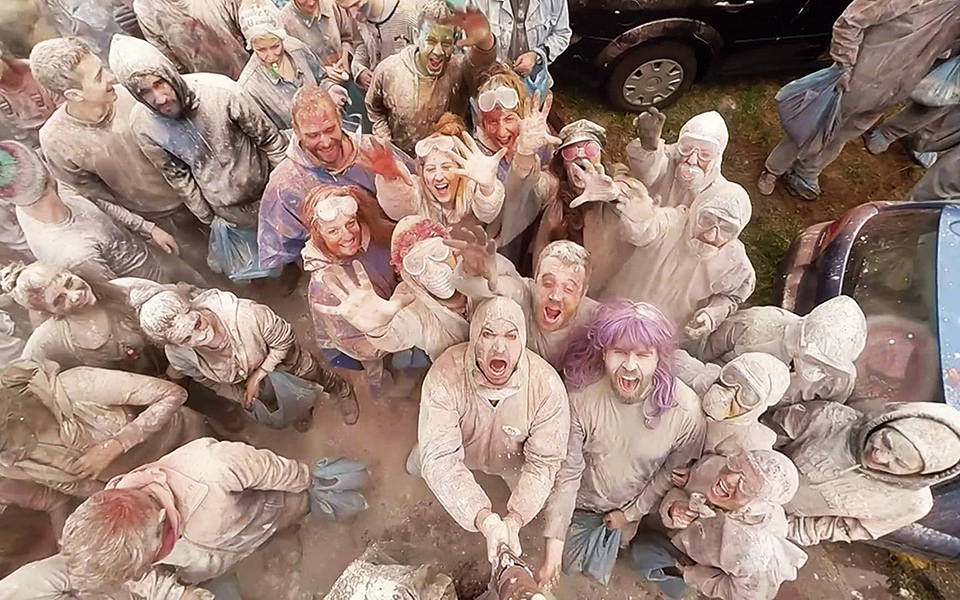
Flour wars at Galaxidi
Clean Monday in Galaxidi, on the mainland’s southern tip, is a day of battle as carnival participants break out into a flour war, known as the Alevropolemos. Opinion varies as to the ritual’s origins. Some claim local sailors brought the tradition back from Sicily, while others believe it hails from India or emerged in the Byzantine era.
On Clean Monday, February 27th at around 14:00, a procession of carnival participants heads down Papapetrou St. Bags of flour are tossed all around and elegant Galaxidi ends up a mess, covered with white clouds of powder to the insistent sounds of daoulia ( traditional hand-held drums) and pipizes (traditional high-pitched flutes). Anybody requiring additional ammunition may be supplied at the local bakeries and makeshift stalls. In more recent years, participants have added color to the spectacle by adding lampblack to the mix in shades of electric blue, yellow and red. Bonfires, dancing and wild parties ensue in every neighborhood. Many flour-covered individuals opt to bring the mayhem to an end by diving into the cold sea for an instant wash. As for the dress code, participants don old clothes, bandanas and, in more recent times, face masks. If you want to stay clear of the mess, look on in (relative) safely from Pera Panta, the port’s southern side.
INFO | Three hostels, Nostos, tel. (+30) 22650.412.66, (+30) 693.706.4188, To Spitaki, tel. (+30) 22650.412.57, (+30) 697.751.2238, and Ganymidis, tel. (+30) 22650.413.28, 693.715.4567 , are all located very close to the port. Situated slightly beyond Galaxidi, the Apopsis hostel provides rooms offering sea views and fireplaces, tel. (+30) 22650.422.22, (+30) 698.155.3202.
For fresh fish and seafood casserole recipes, consider Skeletovrachos, tel. (+30) 22650.413.03, (+30) 698.787.7263, and Maritsa, tel. (+30) 22650.410.59. Bebelis is a great place for meze dishes, tel. (+30) 22650.416.77. Albatros, a small taverna, serves fine homemade food, tel. (+30) 22650.422.33, (+30) 694.646.5894.
The roots of this custom lie in a legendary romance binding a local tanner, Konstantis, and his partner, Lenio, whose ill-fated death, caused by a thunderbolt strike, prompted her devastated lover to take his own life. His suicide, according to legend, transformed his tormented soul into a spirit that has since wandered about Harmena – a charming district of Amfissa, a provincial town 200km northwest of Athens – where the city’s once-flourishing tanneries were located. The spirits of Konstantis and others are revived on the final three days of carnival. The “Awakening and Calling of Konstantis” ritual is staged on the Friday night in Harmena. The “Night of the Spirits”, a ceremony involving roughly 3,500 participants dressed as bizarre, supernatural creatures, follows on Saturday in the town center. Events culminate on Sunday, when extremely tall, human-like beasts engage in the “Battle of the Spirits”. This ritual includes many ancient aspects and can be extremely frightening at times. To ease any fears, organizers generously treat spectators to a range of local products, including wine, tsipouro (a pomace brandy), the region’s renowned olives, boiled goat stew, and fasolada (bean soup).
INFO | For accommodation, consider the traditional hostel Omoplinthos, tel. (+30) 693.707.8862, or Amfissaeum, tel. (+30) 22650.221.61, (+30) 694.450.3530,, which offer a view of Amfissa castle. For dining, Elladografia, tel. (+30) 22653.004.22, (+30) 693.220.9578, and Aristogefsis, tel. (+30) 22653.006.01, are both worthwhile spots. Also check out Inomagirio, tel. (+30) 22650.288.23, for carefully and lovingly prepared old-style dishes.
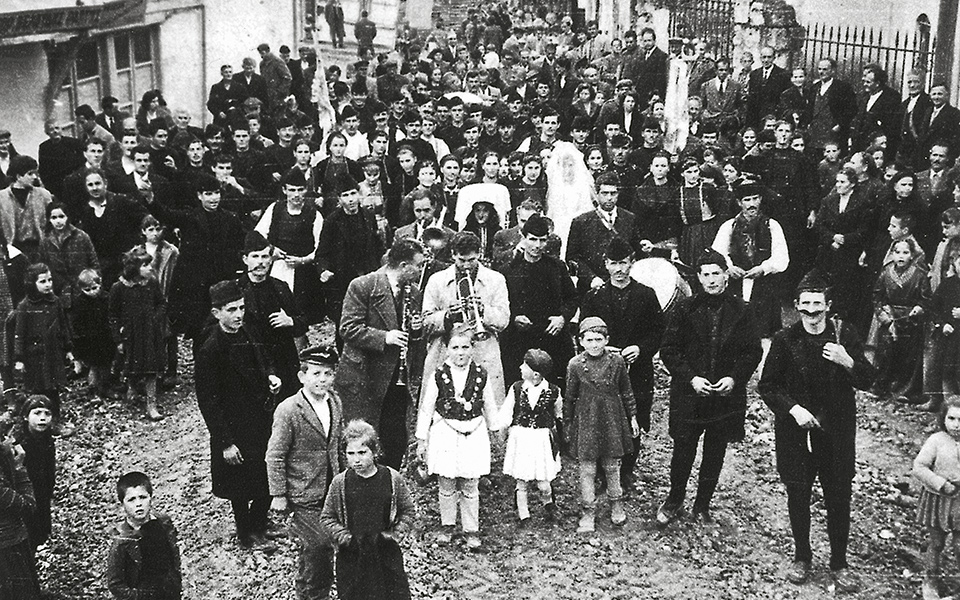
Vlach wedding at Thiva
Symbolizing land and human fertility, a traditional wedding reenactment fuses Thiva’s ancient Dionysian past with a tradition introduced by the Vlach people. In the 19th century, they relocated from the Aspropotamos region, in the west of the country, to Thiva (also known as Thebes), 50km northwest of Athens. In an integral part of Thiva’s carnival celebrations, roughly seven teams numbering at least 30 persons each, all dressed in traditional Vlach costumes and holding shepherd’s crooks as well as a flambouro (a flag depicting a cross that is fastened to a branch topped with three apples, symbolizing fertility), generate a racket. On Sunday, the processions of these groups begin from the homes of captains, who pass by other houses to gather their men. The small celebrations along the way, fueled by the sound of pipizes and daoulia, converge on the main square. The festivities spread to the shops, where all visitors are welcome. Early next Monday morning, each group lights its own fire on the square, reigniting the celebrations. Wine is served, Pyrrhic (war victory) dancing, as well as other traditional dances, are performed, while the propyra (bridal cake) is baked. Two teams accompanying the bride and groom arrive at Agia Triada church, where the dowry and engagement of this arranged marriage (proxenio) are finalized. Various humorous events occur at this stage of the reenactment as the bride’s virginity is disputed, prompting the groom’s side to demand more dowry, all in the Vlach language, before the wedding triumphantly takes place. The groom then passes away to the sounds of laments and cries, while his ensuing resurrection, accompanied by profanities and phallic symbols, highlights the event’s fertility-linked purpose.
INFO | For hotel accommodation, consider Niovi, tel. (+30) 22620.298.88, Dionysion Melathron, tel. (+30) 22620.815.00, and Philoxenia, tel. (+30) 22620.287.05. For food, popular with locals are Ladokolla, tel. (+30) 22620.284.00 and Zythos, tel. (+30) 22620.814.70, for their meze dishes and carefully prepared meat and seafood dishes, as well as Tzaki, tel. (+30) 22620.293.07, for its grilled meat.
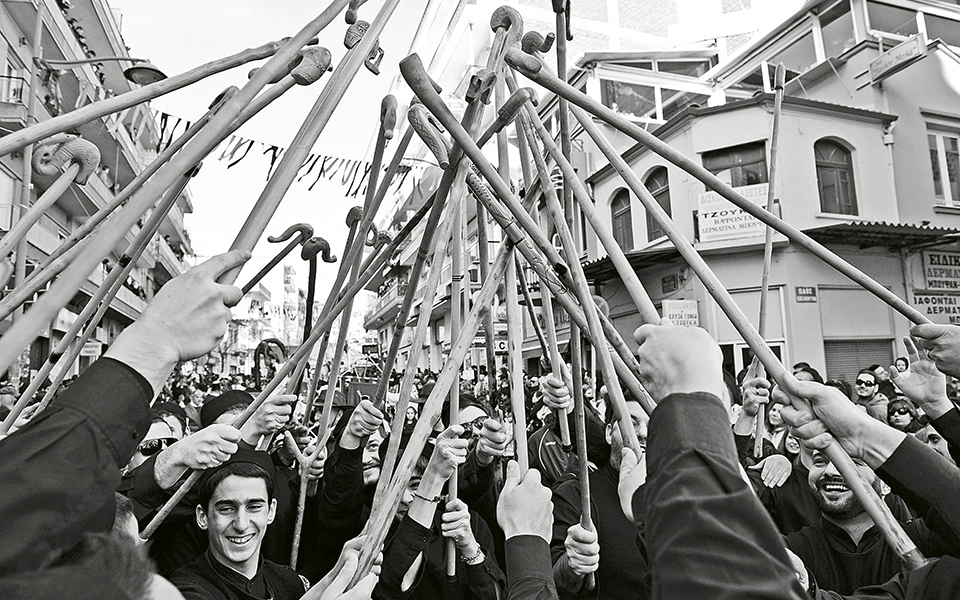
Carnival celebrations at Kozani
© Andreas Tzimos
On the last Sunday of carnival in the western Macedonian city of Kozani, fires are lit inside metal cauldrons placed at intersections. The Fanos custom, bearing Dionysian elements and dating from the period of Ottoman rule, livens up the city’s neighborhoods. It was the only custom the subjugated locals were permitted to perform under the Turks, according to Kozani’s elderly citizens. The custom emerged from the need for some form of communication between the Greek freedom fighters in the mountains and their families. Three centuries ago, these fires were lit with the purpose of summoning fighters to return home. Nowadays, 14 fires are organized by societies that have assumed the role of passing on the tradition from one generation to the next. The event has also developed into a contest between the societies over who can stage the biggest and longest party. The most successful go on all night. There is no leeway for mere observation here as everybody ends up getting involved. Young and old, and locals and foreigners, end up singing lyrics to songs that have remained unchanged over three centuries. Brass wind instruments, a dominant sound in traditional northern Greek music, deliver songs of love, traditional kleftika numbers rooted in the Greek rebellion against Ottoman rule, as well as satirical songs called bedia and kasmeria by the locals. The long and heady celebrations end with songs, known as xediadropa, or shameless songs. For the final act, the flames are extinguished, marking the beginning of the sowing season. The ashes are then spread over the fields to fertilize them.
INFO | For hotel accommodation, consider the renovated Ermionio, Nikis Sq, tel. (+30) 24610.394.00, and Katerina, 20 3rd Septemvriou, tel. (+30) 24610.348.56, whose top floors offer panoramic views. For food, try Mouses, 5 Pindou, tel. (+30) 24610.286.54, which serves local culinary delights such as giaprakia (stuffed cabbage leave rolls) and splinantera (traditional sausage usually filled with lamb or goat heart and spleen) or Zinos, 6 Artemidos, tel. (+30) 24610.325.14, renowned for its roast lamb.
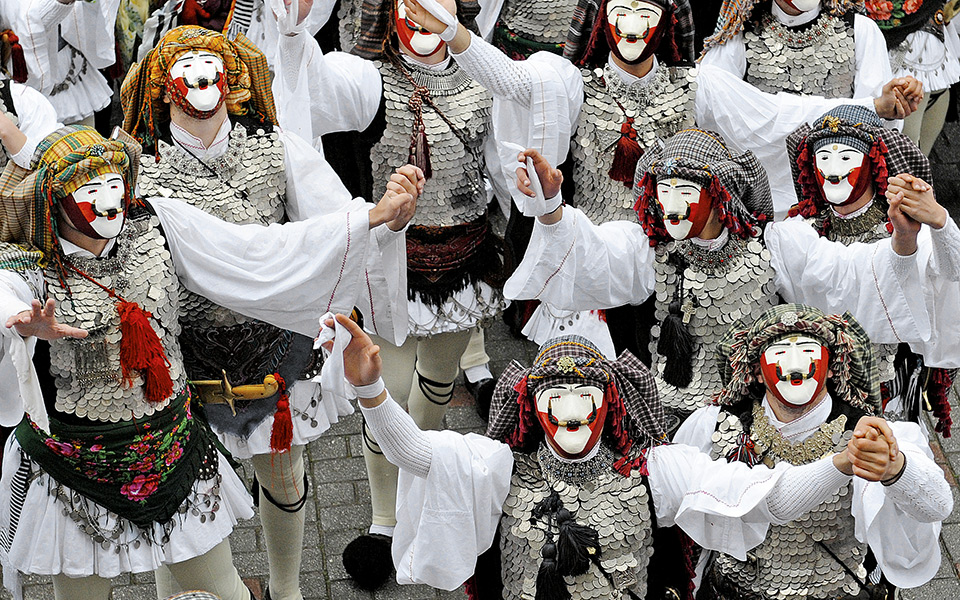
Masked participants in the Naoussa rituals
© Giorgos Tsafos
The locals of this northern city distinguish their Boules celebration from other carnival festivities around the country. The Naoussa version, originating in antiquity and featuring unclear roots that stretch back centuries, became fully established during Ottoman rule. Visitors do not take part but simply observe this male-only ritual that begins at 07:00 on Sunday in people’s homes and ends four hours later at Alonion Sq, where Yenitsari or Janissaries (an elite Ottoman military unit originally staffed by Christian youths who had to convert to Islam), as well as Boules, men impersonating women without ridiculing them, all end up. The Yenitsari are dressed in the foustanela, a traditional short pleated white skirt worn by men, headbands as well as attire decorated with coins, amulets and chains. The Boules wear a multi-colored women’s costume that symbolizes spring and nature’s rebirth. The faces of all participants are covered by white masks made of wax or plaster. Most of the masks have been handed down from generation to generation. Some 280 persons are expected to dress up for this year’s event. Accompanied by zourna (a traditional high-pitched instrument that sounds like a clarinet) and the beat of daoulia, the ritual’s exponents parade through the old city. Having reached the town hall, the head Janissary and one of the boules are granted permission by the mayor to perform the custom with their group members. Dancing then follows. The performers remain silent during the ritual until their faces are revealed.
INFO | Quality accommodation is offered at the Palea Poli boutique hotel, 32 Vassileos Konstantinou, tel. (+30) 23320.525.20, housed in a restored building dating to 1900, and at the more centrally located Dellagio, 22 Megalou Alexandrou, tel. (+30) 23320.223.33, which offers a view of the municipal park. For food, Spondi, 17 Karatasou Tsami Sq, tel. (+30) 23320.222.33, is recommended for its fine food, as is Tesseris Epoches, Agios Nikolaos, tel. (+30) 23320.262.21, whose menu features traditional casserole dishes.
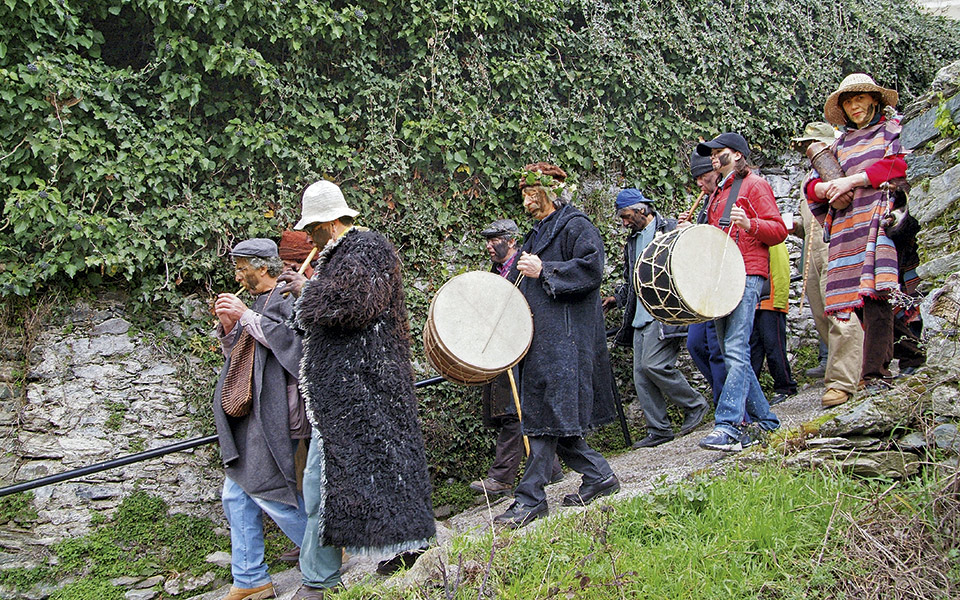
Carnival rituals at Nedousa
© Tasos Vamvakas
An authentic agricultural event dedicated to a prosperous and fertile year is held on Clean Monday in the Messinian provincial town of Nedousa, in the southern Peloponnese. Michalis Meraklis, a folklore professor at the University of Athens and president of the Greek Folklore Society, considers this event as significant as any archaeological discovery. Although similar rituals exist in parts of northern Greece, the Nedousa version is presented more comprehensively and features three thematic acts – plowing/sowing, marriage/procreation and death/resurrection. Equally impressive is the passion shown by locals when this ritual is performed. Faces are smeared with soot to symbolize equality, while daoulia drums, flutes, phallic symbols and profanities set the overall tone. The ritual begins with the agermo, a procession that protectively circles the village, during which food is gathered from homes. It continues with a collective table meal, a symbol of peace, at the square. Then, the performance’s cast, donned in hairy attire, cow bells and horns, begin their Horo ton Tragon, or dance of the bucks (adult male goats). The ceremony’s arotriosi (cultivation) and spora (sowing) acts are performed rather devoutly. Two men disguised as oxen act as if plowing the square with a plow, covering the area three times. Fellow cast members follow and sow. The marriage and procreation attempt add a humorous dimension to the performance, while the murder of the groom, his mournful funeral and resurrection bring the custom to its finale, signaling the start of the celebrations. The evil spirits have been expelled, life has triumphed over death, and nature is set to awaken and bear fruit. Although visiting spectators do not play leading roles, they are factored in as fellow celebrants. They end up with soot-smeared faces, follow the procession, are invited to sit at the table meal and experience the ritual’s cathartic process.
INFO | Accommodation is available in the nearby village of Alagonia at Alagonia Orini Filoxenia, tel. (+30) 27210.760.38, which offers wooden chalets and hosts a very good taverna. Otherwise, a number of worthwhile options are available in Kalamata: Elite, 2 Navarinou, tel. (+30) 27210.224.34, Horizon Blu, 217 Navarinou, tel. (+30) 27210.800.99; and Εlektra Hotel and Spa (Psaron and Bouboulinas, (+30) 27210.991.00. For food, Koupitsa, tel. (+30) 27210.761.17, located in nearby Artemisia, is recommended for its fine meat dishes cooked in a wood-fired oven.
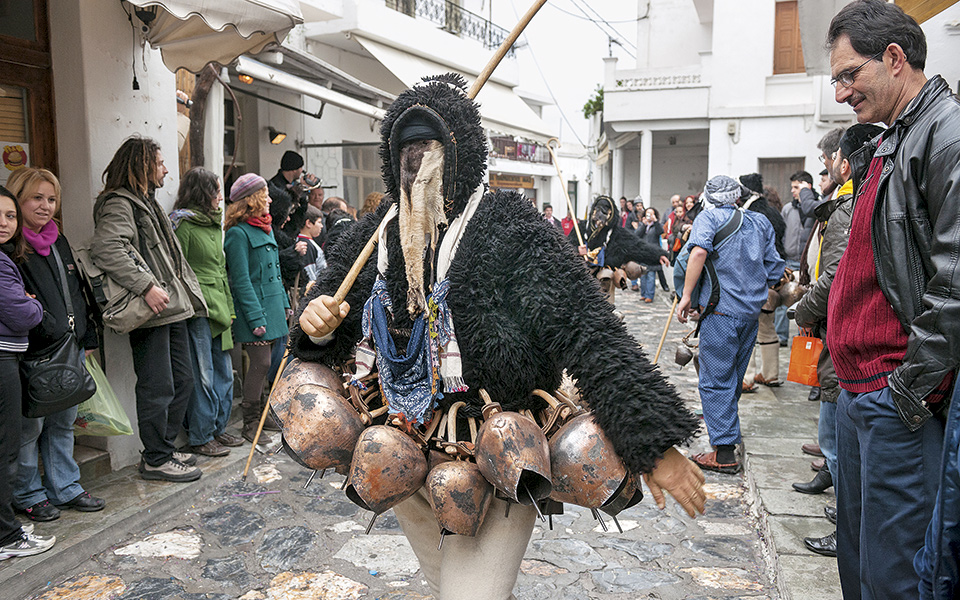
40 cow bells hang from each participant at Skyros' party
© Giannis Giannelos
Unbridled ecstasy is the ultimate experience felt on the island of Skyros during carnival celebrations. Launched once the Triodion, or pre-Lenten period, has started, and repeated every weekend for about a month, the island’s ritual culminates during the final three days of carnival. It features mystical Geri (men impersonating old shepherds), who are responsible for the noise and the racket. Like animals on the loose, they spill out into the alleys of Hora, the island’s main town, jumping up and down and knocking each other in a contest for supremacy, all of which produces loud sounds from the 40 cow bells hanging from each participant’s waist. Their appearance, in traditional costumes and masks, is impressive. The Geri are accompanied by Koreles, traditionally men dressed as women, but nowadays also including women. Also dressed in traditional attire and with their faces concealed by headscarves, the Koreles sing the korelitiko, a slow traditional song, while waving a handkerchief in their hands. One Frango (Frank), dressed in European style, completes the cast. Covered behind a funny mask, this character assumes the task of helping the old men. He holds a traditional wineskin or water-filled pumpkin. Despite the intense Dionysian symbolism, local tradition prefers to interpret the custom as one inspired by old shepherds who, once discovering their herds frozen to death from the cold, skinned the animals and wore their hides and bells. Groups of Geri cause havoc in the main town until Sunday and, every now and again, all head up to the castle, where Agios Georgios monastery is located, to dance and sound the bell. Concurrently, on Sunday, around midday, the Trata, a satirical procession of fishermen and a trawler on the main square, steals the show for a short while. The carnival-dressed fishermen, circling their decorated fishing boat, denounce the year’s main events in rhyme. On Clean Monday, all locals instinctively put on their traditional costumes and tirelessly engage in traditional dancing. Circular dances take place in every single alley.
INFO | For hotel accommodation, Nefeli, Plagia, Hora, tel. (+30) 22220.919.64, and Perigiali, Magazia, tel. (+30) 22220.920.75, are recommended. For food, head to Amalthia in Hora, tel. (+30) 22220.923.89. This exceptional taverna serves dishes featuring meat, cheese and vegetables produced by the owner. O Papous ke Ego makes delicious meze dishes and casserole recipes with a local touch, tel. (+30) 22220. 932.00. Maritsa café in Hora, tel. (+30) 22220.912.76, and Stelios, tel. (+30) 22220.913.85), offers a sea view around Gyrismata beach.
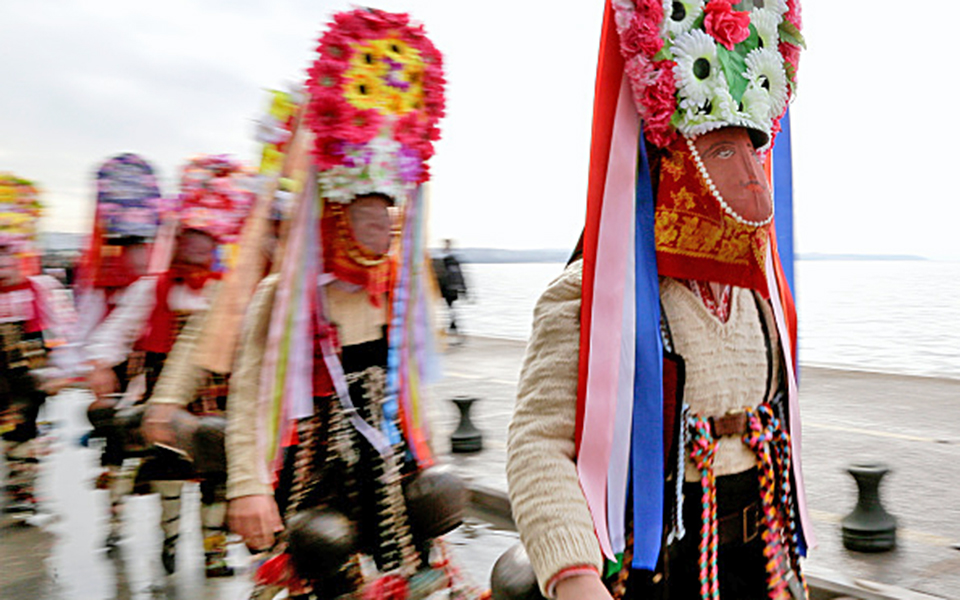
The impressive attire worn by participants at Sochos is complemented by goat or lamb hide garments, tippets and heavy bells
© Getty Images / Ideal Image
Kalpakia, otherworldly masks with a fox tail as a mustache and capped with a multi-colored compact ribbon formation of up to a meter in length, are the centre of attention at an ancient custom held to spur agricultural production in the town of Sochos, located on a plateau 600 meters above sea level, about 55 kilometers from Thessaloniki. The impressive attire worn by participants is complemented by goat or lamb hide garments, tippets and heavy bells. The renowned Sochos carnival features a number of 20-member groups that dance in neighborhoods to the sound of daoulia drums and clarinet-like zourna for a series of days during the Triodion, or pre-Lenten period. Onlookers are offered ouzo, impromptu celebrations take place in shops and the bells attached around the waist of participants are shaken about ecstatically. Over time, this Bacchic ritual was Christianized and the bell carriers went on to symbolize military units that fought the Ottomans in the area. It is worth making it to Sochos ahead of the Clean Monday long weekend in order to fully experience this authentic custom and appreciate its importance for locals. The first acts of the wedding reenactment are performed on the final Saturday of the Triodion. Three fires are lit in neighborhood areas. The wedding ceremony takes place the following day. Visitors also take part. On Clean Monday, around late afternoon, the bell carriers present themselves in an organized form, as part of the wider procession. Visitors may purchase bells from roving vendors. They are of significantly inferior quality compared to those worn by the performers, who carefully choose their bells months in advance. Performers also wear custom-fitted masks – which are not available for purchase – that are crafted at a specialized workshop.
INFO | For accommodation, the best option is Thessaloniki, where the choices are plenty. As for dining, local meat and cheese, as well as fasting options, feature on the menus at the town’s tavernas. Archontiko, on the square, tel. (+30) 23950.230.63, and the two tavernas operating in the Exochika area, are all recommended. Definitely try the exceptional cheese varieties, especially kaseri, at Prika the cheese shop, tel. (+30) 23950.220.52.
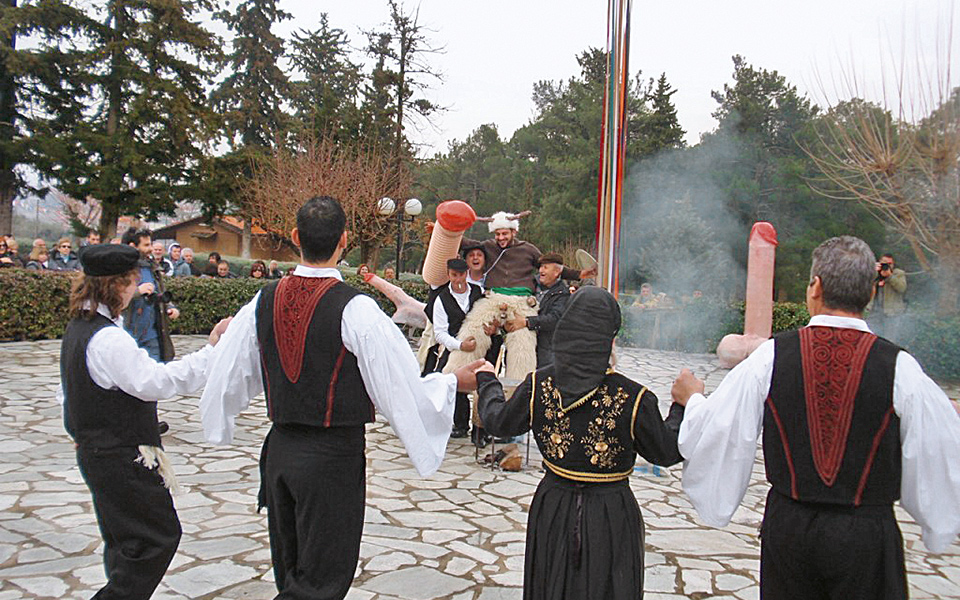
Worship of King Phallus at Tyrnavos
Bourani, the carnival ritual at Tyrnavos, in the Thessalia region, takes its name from an olive oil-free soup made with rice, spinach, nettle and vinegar. The Clean Monday proceedings, staged around a large pot, highlight their Dionysian roots, making this custom one of a kind. Dressed carnival participants and their floats are the focal point on Sunday before the baton is passed on to the phalluses (fali), which show up in countless forms and sizes – as bread, ceramic souvenirs, balloons and lollipops. Shameless songs and profanities linked with the symbol of the day are standard features. All in attendance are expected to greet and worship King Phallus. Nothing is considered inappropriate here. Visitors need to be prepared for just about anything. The town’s renowned tsipouro spirit flows freely, abolishing any barriers or reservations. Feeling awkward at first, newcomers tend to gradually overcome the shock. By midday, when the float featuring a phallus and coffin rolls by, all onlookers wish for its resurrection. A mechanism is activated, and, to the overall delight of onlookers, the dead phallus rises.
INFO | There are no hotels in Tyrnavos but accommodation is available in Larissa, 17km away. The Larissa Imperial, tel. (+30) 2410.687.600, and Divani Palace Larissa, tel. (+30) 2410.252.791, are recommended. For food try one of the many tsipouradika in Tyrnavos. Statiri enjoys a fine reputation, tel. (+30) 24920.224.45.
Step off the beaten path this...
As Greeks gather for their Tsiknopempti...